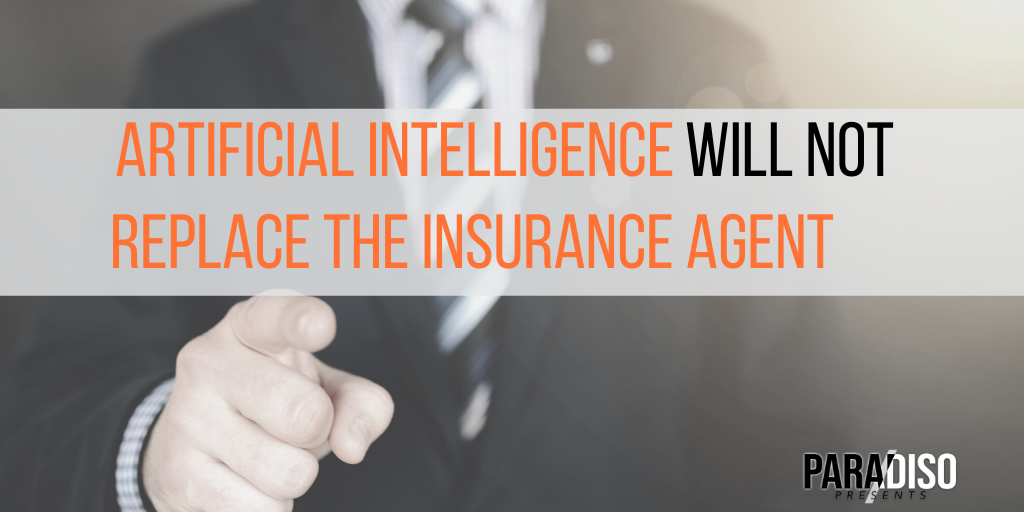Insurance sales today look wildly different than they did just five years ago. You can use augmented reality to test furniture in your living room and upload pictures of yourself to see how clothes look on you. You can purchase from online retailers on the other side of the world with a simple click. You can even buy from paid ads chosen for you by fancy and sophisticated algorithms.
As awesome as all this technology is on the consumer end, the newfangled efficiency and increased productivity also come with the inevitable fear from agency owners that artificial intelligence, also called AI, will eventually replace human insurance salespeople. So question is…will it?
A handful of agency owners reached out to me recently, saying that AI will replace their agents over the next three years. These agency owners feel that the traditional insurance salesperson won’t have a place much longer within their agency. But the reality is that artificial intelligence can’t come for an insurance agents job just yet. Why do I believe this? Well, some basic human skills that we often take for granted—which I like to call human “superpowers”—are why real-life insurance salespeople will have a seat at the sales table for the foreseeable future.
Let me dive into what these insurance agent human superpowers are, that artificial intelligence can’t replace for years to come.
Empathy: a human superpower
As any successful agent can tell you, a high EQ (emotional intelligence) goes a long way. EQ is the capability of individuals to recognize their own emotions and those of others. While statistics play a vital role in every agency—and statistics are obviously very helpful in persuading a prospect to buy—they are not enough in most cases to close the insurance deal.
When you’re able to imagine yourself in your client’s shoes, you can envision their wants, needs, desires, pain-points, and frustrations; a great insurance agent will tailor their insurance advice to address these needs. People want to feel heard and understood and that is only achieved in one way, through empathy. AI doesn’t have that ability yet.
Empathy is defined as the ability to understand and share the feelings of another. A great agent understands the power within empathy. Now, we could get into a long discussion with technology gurus on whether or not artificial intelligence will ever be able to “feel” anything, but that would be irrelevant if they can’t even understand.
So the million dollar question is: can artificial intelligence understand humans? Well, not yet. At this point in time, even with technology moving at light speed, AI is a long way off from being able to identify not only what other people are feeling, but even who they are, which poses a significant challenge.
Effective judgment
It’s not enough to be able to process words, sounds, and movements. Insurance agents are required to pay very close attention to their clients so they can make intelligent suggestions to properly cover them. This is extremely important in helping you effectively close more business and retain more clients.
To make smart decisions, insurance salespeople must understand who their specific client is and what their intentions are. Not everyone is a prospect, nor is everyone a great client. Based on that information, they then render a judgment of the situation and determine an appropriate response. Humans do this every single day, but the question is whether AIs are up to snuff.
Though technology can detect a person’s basic body language or tone of voice with relative accuracy, it isn’t yet at the point where it can evaluate many gestures at once and combine the information to get a more complete picture—which is what humans do all day, every day, without even thinking about it.
The 2 Cs: Charisma/Communication
Charisma is a “compelling charm that inspires devotion in others”; while robots are definitely making some headway in this area, we’ve yet to see a truly charismatic robot.
Charisma in conversation is important because it builds trust and motivates action. Building trust is the key to all relationships. Consumers today are particularly wary of being taken advantage of; they’re constantly on the lookout for exaggerations and false claims. Credibility and transparency has become the platinum standard.
So can robots be charismatic? The answer in my opinion is a resounding absolutely not, or at least “not yet.”
To have charisma, you need to be able to continuously evaluate the emotions of the people you’re interacting with (which we established that AI can’t do), make decisions based on these evaluations (which AI also can’t do), and then communicate that decision in a way that is “pleasing” to the prospect or the client.
In Conclusion
Artificial intelligence is a wonderful thing but it still has a long way to go. AI is great at looking at wildly complex data sets and finding patterns, which is why our agency loves the DONNA® platform by Aureus Analytics. It is excellent at identifying trends based on numbers; for example, my book of business has 85% homeowners’ policies with sewer and water backup coverage. When the AI finds a policy without this coverage, it tells me. However, when it comes to the basic human skills absolutely essential for selling, AIs are lacking.
What other uniquely-human superpowers do you think AI will have a hard time replacing? I’d love to hear from you! Share your thoughts in the comments to join the conversation.





